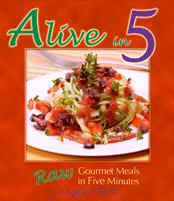Seven Food Preservatives You Really Want to Avoid
by www.SixWise.com
Food preservatives such as salt, sugar, vinegar and other spices have been used since ancient times to keep perishable food fresher longer. Today many preservatives have grown more complex, which is not necessarily a good thing.
|

Propyl Gallate, a preservative used in chewing gum, vegetable oil, chicken soup base and more, has been linked to cancer.
|
The Food and Drug Administration regulates food preservatives, and while they're not all bad (antioxidants such as vitamins C and E are used to keep certain foods from spoiling, for instance) there are some that you definitely want to avoid.
The most effective way to keep preservatives out of your diet is to eat only fresh, locally grown foods. Those of you looking to incorporate more of such foods into your diet will absolutely love Alive in 5, a raw-food cookbook packed with simple meals you can prepare in five minutes.
But if you venture into the world of processed food at all, you can expect to see a laundry list of preservatives to not only prevent food from spoiling, but also to prevent flavor changes, loss of color caused by exposure to air, and to extend shelf-life.
Following is a list of seven food preservatives that have serious safety concerns. Anytime you buy a processed food product, make sure to read the label and make sure it does not contain any of them.
1. Propyl Gallate
This preservative, used to prevent fats and oils from spoiling, might cause cancer. It's used in vegetable oil, meat products, potato sticks, chicken soup base and chewing gum, and is often used with BHA and BHT (see below).
|
Looking for Quick, Unique, Preservative-Free Recipes?

Alive in 5: Raw Gourmet Meals in Five Minutes is packed with delicious (and fast!) raw food recipes that your whole family will crave!
Try the Banana-Mango Pina Colada Smoothie, the Frozen Tropical Pops or any of the other decadent dishes (like spaghetti marinara, stuffed mushrooms, and broccoli in cheese sauce). This cookbook is an enjoyable and inspiring guide to delicious living.
Order Alive in 5: Raw Gourmet Meals in Five Minutes Now!
|
2. BHA and BHT
Butylated hydroxyanisole (BHA) and butylated hydroxytoluene (BHT) are used similarly to propyl gallate -- to keep fats and oils from going rancid. Used commonly in cereals, chewing gum, vegetable oil and potato chips (and also in some food packaging to preserve freshness), these additives have been found by some studies to cause cancer in rats. If a brand you commonly buy uses these additives, look for a different variety, as not all manufacturers use these preservatives.
3. Heptyl Paraben
This preservative, found in beer and non-carbonated soft drinks, is relatively uncommon. Although studies suggest it is safe, it has never been tested in the presence of alcohol, so it may pose unknown safety risks.
4. Sodium Nitrite (Sodium Nitrate)
Sodium nitrite (or sodium nitrate) is used as a preservative, coloring and flavoring in bacon, ham, hot dogs, luncheon meats, corned beef, smoked fish and other processed meats. These additives can lead to the formation of cancer-causing chemicals called nitrosamines. Some studies have found a link between consuming cured meats and nitrite and cancer in humans
5. Sodium Benzoate (aka Benzoic Acid)
This preservative is used in fruit juice, carbonated drinks and pickles to help prevent the growth of microorganisms in these acidic foods. Sodium benzoate may cause hives, asthma, or allergic reactions in sensitive individuals, and may adversely effect behavior in children, particularly those with ADHD.
Further, when sodium benzoate is used alongside ascorbic acid (vitamin C) in an acidic solution, a reaction occurs that causes the formation of benzene, which causes cancer.
|

Though generally safe for most people, sulfites used in wine and dried fruits can cause severe allergic reactions in people who are sensitive to it.
|
U.S. officials and members of the beverage industry have known about this problem for some 15 years, and drink makers were supposed to reformulate their products to prevent the problem over a decade ago.
However, tests have uncovered that some beverages still contain high levels of benzene, particularly when exposed to high heat, raising consumer concerns and prompting the filing of a class-action lawsuit.
6. Sulfites (Sulfur Dioxide, Sodium bisulfite)
This preservative prevents discoloration in dried fruits, wine, processed potatoes, and some fresh shrimp. Sulfiting agents destroy vitamin B-1 and may cause severe allergic reactions, particularly among people with asthma.
7. Ultra Pasteurization
Not technically an additive, ultra-pasteurization refers to a type of high-temperature processing that gives milk and dairy products an extended shelf life of up to 50 days. Also known as "ultra-high temperature" (UHT), this process may damage the fragile components of milk, for instance flattening milk proteins so that enzymes can no longer help break them down.
According to Lee Dexter, microbiologist and owner of White Egret Farm goat dairy in Austin, Texas in a Weston A. Price article, "If such proteins pass into the bloodstream (a frequent occurrence in those suffering from "leaky gut," a condition that can be brought on by drinking processed commercial milk), the body perceives them as foreign proteins and mounts an immune response. That means a chronically overstressed immune system and much less energy available for growth and repair."
Want to Make Your Food Last Longer?
On average, American families throw away 14 percent of the food they buy, and a large part of that is food that becomes spoiled before it's eaten. However, there is a solution, and it's preservative-free!
|

Aside from keeping your foods fresher, longer, the Minimate Refrigerator Unit helps to break down pesticides and herbicides on produce.
|
Using FDA-approved technology, the Minimate Refrigerator Unit can extend the freshness and life of many of your foods by three to four times. It works by eliminating most of the germs or mold that may be living on your foods without harming the food or leaving behind any residue.
According to Consumer Reports, "This safe technology has been used for years in the wholesale produce and cut flower industries to extend the life of their products. Why? Because it kills the bacteria and mold that could spoil your food and make you sick.
The MiniMate takes this technology and shrinks it down to an appliance not much bigger than the box of baking soda that is probably in your refrigerator now. But instead of just deodorizing it helps sanitize too, making it a great deal for anyone who is concerned about their health."
Recommended Reading
What are the Least Safe Foods From a Contamination Perspective?
How Long Before Different Refrigerated Foods Spoil (& Other Secrets to Your Refrigerator)
Sources
Center for Science in the Public Interest Food Safety
The Weston A. Price Foundation Ultra-Pasteurized Milk